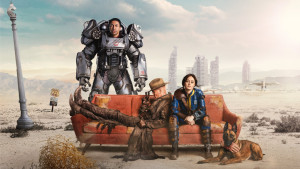Please support Game Informer. Print magazine subscriptions are less than $2 per issue
Science-Fiction Weekly – Star Trek Vs. Star Wars

When I posted the first edition of Science-Fiction Weekly two weeks ago, I didn’t anticipate receiving a flood of negativity towards my top picks for the best movies, games, and television shows. I also didn’t foresee people taking issue with Star Wars being included in this column. The complaint they lobbied? Star Wars falls more into the fantasy genre than science fiction.
I couldn’t disagree with this assertion more, and I won’t go into my reasons here, as you can find them all over the comments and on Twitter, but this discussion made me realize almost everyone has a different understanding of what science fiction is. This revelation made me appreciate the medium more – it’s so unpredictable and untamed that it defies classification.
The dictionary calls science fiction “a form of fiction that draws imaginatively on scientific knowledge and speculation in its plot, setting, theme, etc.”
Isaac Asimov, one of the most accomplished science-fiction writers to date, said “Science fiction can be defined as that branch of literature which deals with the reaction of human beings to changes in science and technology.”
Christopher Evans, the British author of the Other Edens trilogy, believes science fiction begins by questioning 'What if?' In his excellent Writing Science Fiction book, he wrote “What if we could travel in time? What if we were living on other planets? What if we made contact with alien races? And so on. The starting point is that the writer supposes things are different from how we know them to be."
In the introduction to Science Fact/Fiction, Ray Bradbury said science fiction is “the one field that reached out and embraced every sector of the human imagination, every endeavor, every idea, every technological development, and every dream.”
One of my favorite quotes on the subject comes from Norman Spinrad, the author of the great “The Doomsday Machine” episode of the original Star Trek TV series, who said “science fiction is anything published as science fiction."
And finally in Greetings, Carbon-Based Bipeds!, Arthur C. Clarke famously shrugged his shoulders when he wrote "Attempting to define science fiction is an undertaking almost as difficult, though not so popular, as trying to define pornography. In both pornography and SF, the problem lies in knowing exactly where to draw the line."
The definition of science fiction isn’t something we should argue about. We should instead embrace the wonder of it – both in the stories we read and the beliefs other people have of it. We’re all in this spaceship together.

That doesn’t mean we can’t have a good, ol’ fight between Star Wars and Star Trek enthusiasts. Let's call it Warsies versus Trekkers...or Trekkies...or whatever horrible sounding name you want to give yourselves. A few people who complained about my inaugural sci-fi column were mad as hell that Star Trek wasn’t mentioned in any capacity. Sorry for the exclusion, folks, the words “best” and “Star Trek” don’t align for me. Don't get me wrong, I think Star Trek is a great vehicle for science fiction, but Star Wars is far more interesting of a universe. So is Battlestar Galactica. And Farscape. I could go on and on with science fiction I enjoy more.
I’ve watched every Star Trek movie and television series, and have even read a number of its comic books and novels, including a few penned by William Shatner. I appreciate the universe Gene Roddenberry created, and want more of it – a lot more. The upcoming television show should scratch that itch nicely.
The fascination I have with Star Trek is much different than with any other science-fiction universe. I don't want to say it feels like my father's science fiction, but it does. Even as I age, I feel like I'm absorbing some of the most intelligent and expansive science fiction out there. It's daunting in a good way. The immense scale of the cosmos is embraced in all aspects of Star Trek. Although the stories focus heavily on humanity expanding its reach and knowledge, the universe itself is unpredictable and is sometimes established as the axis for a story. Many of the stories convey a higher power or bigger stage than humanity – I always liked that. The writers do a great job of making our species feel small and insignificant. Although we are just observers, the show is written in a way that makes me feel like a part of the crew, trying to problem solve an anomaly together.
Star Trek's narrative threads are rarely backed by spectacle, however. The Enterprise is a grand showpiece of technology, but the people within it wear colored onesies and wield weapons that look like TV remote controls. I'll just come out and say it: the costumes are often terrible. Sorry, but each Enterprise crew wears a getup that either looks like they should be a part of a musical television show for children, or a mechanic who is going to change the oil in your car.
The commonness of the visuals also extends to the aliens, most of which are humanoid in makeup. The reasons for this are explained in the Star Trek: The Next Generation episode, "The Chase," but it's a tough concept to swallow. The idea, which I won't spoil here, fits with well Star Trek's long-running lore, but also screams of "Costumes were kind of hard to make back in the day. Did you see how terrible our Gorn looked? Let's not do that again."
That's where Star Wars captures the imagination and Star Trek feels a little too close to home. The two universes couldn't be much different in this capacity. Most Star Wars aliens, vehicles, weapons, and armors fuel the imagination, and are intentionally left ambiguous for these reasons. Boba Fett is the perfect example of a character that you immediately want to know more about.

Even with so many different exotic types of life coming together, Star Wars' universe often feels small, almost like a backwater town in Kansas where everyone knows everyone. Luke Skywalker unknowingly teams up with his sister to take on their father... who just happens to be the creator of the protocol droid they've been traveling with. Everyone is apparently related or has history with each other. The unlikely connections extend far beyond the movies and are more egregious in the comic books and novels. In the time between A New Hope and The Empire Strikes Back, Luke apparently battled Boba Fett and Darth Vader. Jar Jar Binks even becomes a part of this Luke's story, which, correct me if I'm wrong, should be the last thing a writer ever attempts with Star Wars.
Star Trek's universe, on the other hand, feels gargantuan, rarely collapsing in on itself for unlikely cameos or cheap storytelling connections. While Star Trek: The Next Generation's writing and characters are hard to top, Star Trek Voyager's seven-year run is my favorite in the series. As Captain Janeway and her crew explore uncharted space, the feeling of isolation and uncertainty hangs over almost every episode. If you just watch Voyager without seeing any other Star Trek show before it, that impact likely won't be the same, but for fans, this run greatly expands the size of the universe, and more impressively, makes all of the Star Trek lore around it seem bigger and more meaningful. I've said this numerous times before, but Voyager still doesn't get the respect it truly deserves. That was one hell of a TV show.
Again, I thoroughly enjoy both universes – and they really couldn't be more different – but Star Wars' mythology is the crowning jewel of science fiction for me. As fantastical as it can be, it feels familiar at times; keeping you grounded as it introduces you to a universe where almost anything is possible – from magical abilities to technology being powerful enough to destroy planets. But at its core, Star Wars' story is about family, and the struggles each of us has to find our place in the world. It has heart, and is an easy narrative to latch onto. Once it takes hold, which it did for me when I was young, I wanted more from it – more than I ever wanted from any other form of entertainment. I wanted to know more about the Force, Jedi, Sith, and the history between the Rebellion and Empire. I wanted to know more about the vehicles and science. That fascination has lasted for decades. Even during the rough prequel years, my love for Star Wars hasn't diminished at all.
I am now turning the floor over to you. To reiterate, comparing Star Wars and Star Trek is a strange thing to do, but I want to know which universe you gravitate toward more, and why one speaks to you more than the other. As I briefly detailed above, both of them have unique strengths and weaknesses. With E3 looming, my time is short these days, but I'll do my best to stay on top of the comments and provide feedback. I'll see you again in seven days!











